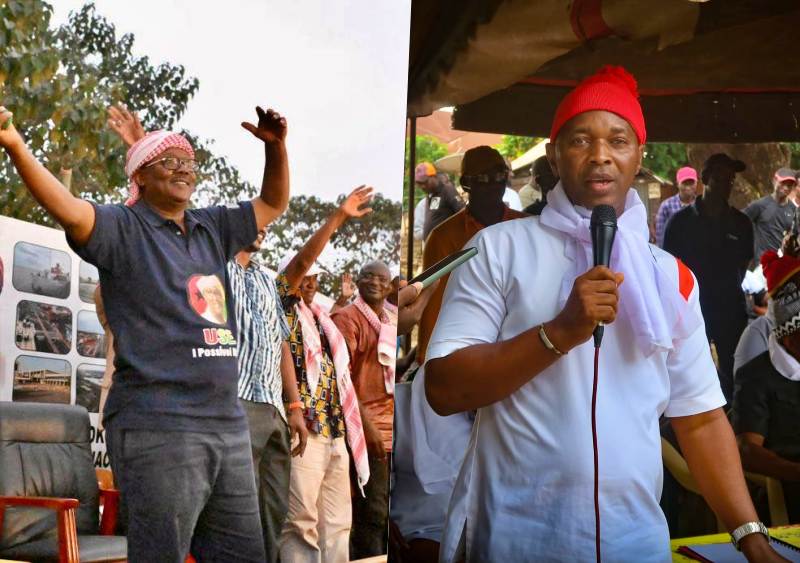Gambiaj.com – (BISSAU, Guinea-Bissau) – Guinea-Bissau heads to the polls this Sunday, November 23, in what many observers describe as one of the country’s most decisive presidential elections in recent years. More than 966,000 registered voters are expected to cast their ballots, choosing among 12 candidates.
Yet the race has unmistakably narrowed into a showdown between two men with sharply contrasting visions: incumbent President Umaro Sissoco Embaló and jurist Fernando Dias, backed by the historic PAIGC party.
Their contest unfolds against a backdrop of political fatigue, institutional fragility, and widespread calls for stability—an environment that has turned this election into a defining moment for the small West African nation.
Sissoco Embaló: A Soldier-President Seeking a Second Mandate
At 53, Umaro Sissoco Embaló is attempting to secure a second term and achieve what only one other Guinean leader has managed: completing a full five-year presidential mandate. A former military officer, now a retired general, he leads the Republican Platform Nô Kumpu Guiné, a coalition he created to bolster his political influence.
Sissoco has anchored his campaign on the promise to strengthen local governance. His flagship proposal is to organize Guinea-Bissau’s first-ever municipal elections, which he says are long overdue in a country that has held eight legislative polls but not a single local one.
“Decades of a democracy without local self-government legitimized by the direct vote of citizens have not dignified Guinea-Bissau,” he declared during the launch of his electoral manifesto.
His political rise began in 2016 when he briefly served as Prime Minister before resigning months later. In 2019, he won the presidency after a tense run-off marred by disputes that the Supreme Court eventually settled in his favor.
Sissoco’s presidency has been defined by turbulence. He has formed three governments without parliamentary backing, citing constitutional loopholes, a practice harshly criticized by opposition and legal experts. His tenure has also faced allegations of repression, human rights violations, and a tightening of civic space.
Critics point to his combative style of governance, even as his supporters praise his diplomatic energy and efforts to elevate the country’s international profile.
He argues that Guinea-Bissau is stronger today than when he took office.
“We are consolidating institutions, the democratic rule of law, and social cohesion,” he said. “Infrastructure reforms have completely renewed Bissau, which was previously sad and decadent.”
But for Domingos Simões Pereira, the influential PAIGC leader, the president’s record is marked by abuse of power.
“Public administration has become a space of clientelism and impunity,” Pereira charged. “State resources are used to buy loyalties and finance personal luxuries. Corruption has become a mode of governance, and fear a political instrument.”
Fernando Dias: The Lawyer Positioning Himself as ‘Hope’
Opposite Sissoco stands Fernando Dias, a 47-year-old lawyer and former government minister who has styled his candidacy around the themes of reconciliation, inclusion, and institutional balance.
Initially running as an independent supported by the API–Cabas Garandi coalition, he later won the endorsement of the PAIGC—a boost that brought organizational muscle and political momentum to his campaign.
Dias frames his bid as a turning point for a country weary of endless political showdowns.
“I present myself as hope,” he said in his manifesto. “My vision is for an independent, united, and inclusive Guinea-Bissau. I will guarantee perfect coexistence between the Assembly, the Presidency, the Government, and the courts.”
His political career began within the PRS, where he served as vice-president of Parliament and later held key executive roles, including director-general of the National Shippers Council and Minister of Territorial Administration in 2020—an appointment made by none other than Sissoco Embaló. The alliance collapsed after the dissolution of Parliament in 2022; Dias refused to join the president’s new government, signalling a deepening political rift.
Today, he positions himself as the credible alternative to what he describes as a cycle of instability and unilateralism.
Human Rights Take Center Stage in a Country at a Crossroads
As the country prepares to vote, civil society voices are urging candidates to prioritize rights and freedoms. Vitorino Indeque, coordinator of the Network of Human Rights Defenders, delivered a stark reminder of the stakes.
“For anyone who wants to be president, the responsibility is to guarantee unity,” he said. “When a person is in power, they must create conditions so that rights become a reality. I advise candidates to have human rights at the top of their agenda.”
In a nation where political disagreements often spill into institutional paralysis, the call resonates deeply.
Sunday’s vote comes amid intense polarization and widespread disillusionment with governance after years of standoffs between presidents, parliaments, and governments. The next leader of Guinea-Bissau will inherit a country hungry for stability, stronger institutions, and a renewed sense of national direction.
For many Guineans, this election is not simply about choosing between Embaló and Dias—it is about choosing between continuity and rupture, confrontation and reconciliation, and uncertainty and hope.
All eyes now turn to November 23. The outcome could set Guinea-Bissau on a new path—or deepen its long-running political saga.










